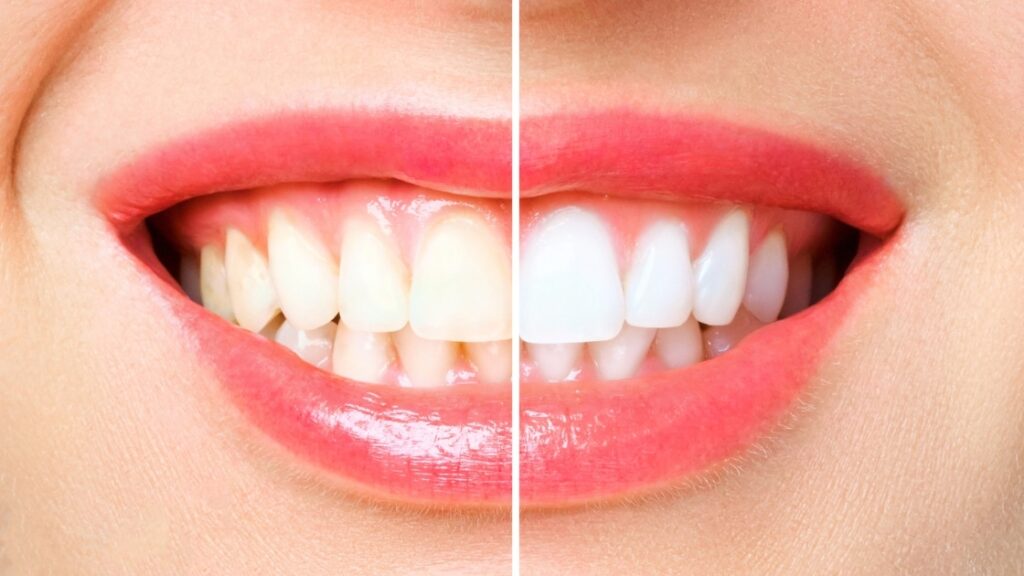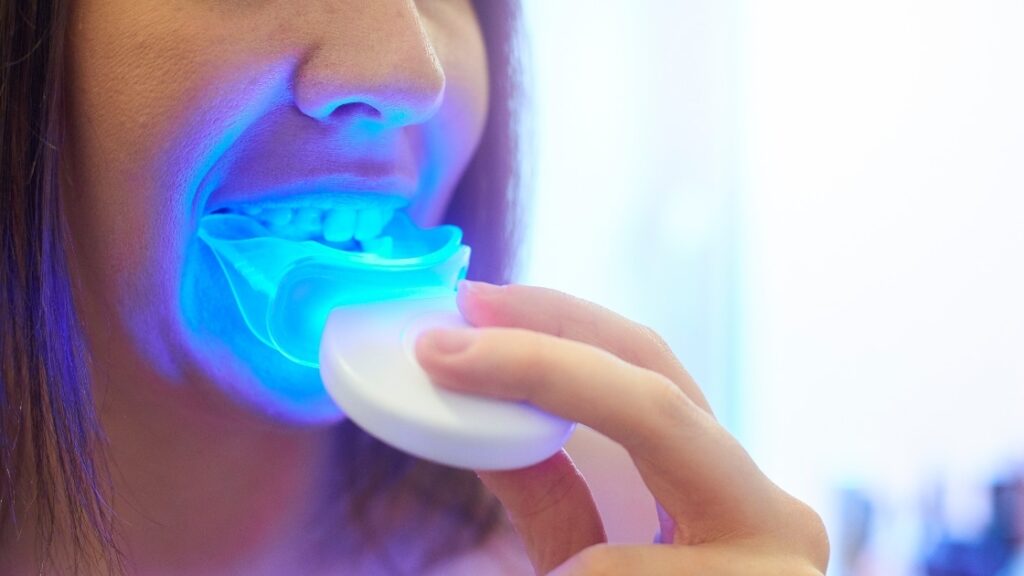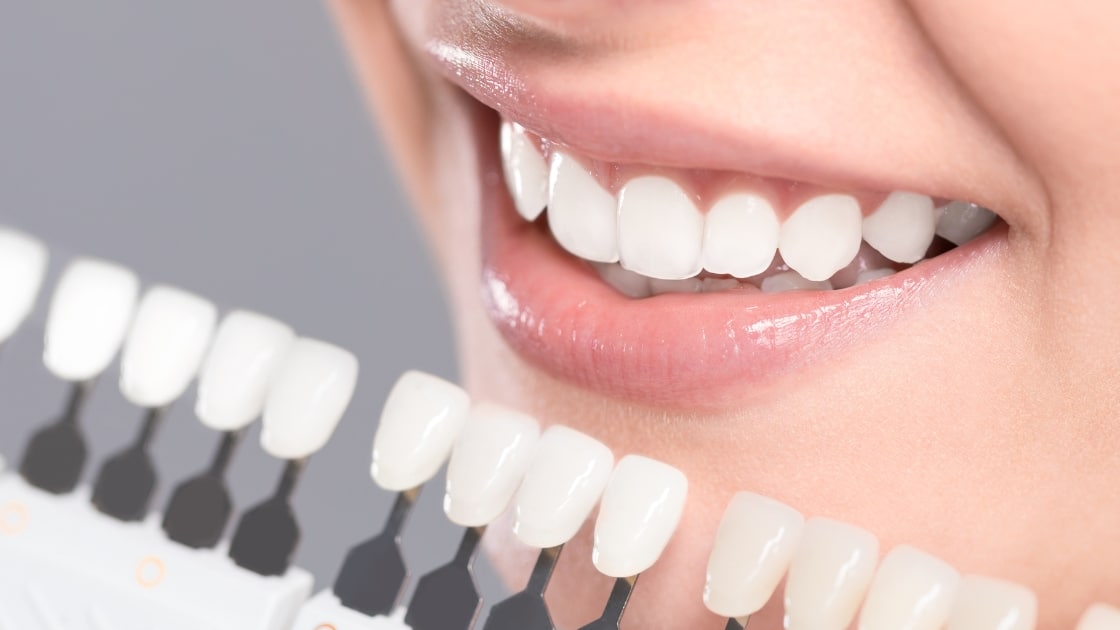Introduction
Is having white teeth healthy? That is a question many of us ponder as we navigate through a world where appearances, notably a beaming smile, hold significant value. From job interviews to first dates, or even a captivating selfie on social media, a radiant smile often leaves a memorable impression. But should we equate the whiteness of our teeth with oral health?
Oral health plays a critical role in our overall well-being. It goes far beyond aesthetics, directly influencing our ability to eat, speak and even shaping our self-confidence. However, a common misconception equates pearly white teeth with optimal oral health. In this article, we’ll dig deeper to reveal the reality behind this widespread belief.
Understanding the Color of Our Teeth: Are White Teeth Healthy?

If you’ve ever looked at a blank sheet of paper and then at your teeth, you might have noticed a stark contrast. Why aren’t our teeth naturally as white as snow? To answer this question, we must understand the composition of our teeth and the factors affecting their colour.
First and foremost, teeth are not naturally pure white. They are typically a shade of yellow or grey, and this is due to the structure of the tooth itself. Teeth comprise a hard outer layer called enamel and a softer inner layer called dentin. Dentin is naturally yellowish, and when combined with the translucency of the enamel, it gives teeth their usual hue.
Several factors can further influence the colour of our teeth. Age, genetics, and certain lifestyle habits play a crucial role. For instance, consuming beverages like coffee, tea, or red wine and habits such as smoking can stain your teeth over time. Even some medications can cause discolouration. Thus, having perfectly white teeth is relatively uncommon and not necessarily the norm we should all strive for.
In the next section, we’ll explore if there’s a direct link between tooth colour and health and if the adage ‘Is having white teeth healthy?’ holds any scientific merit.
For more information on the structure and composition of teeth, check out this article HERE.
Is Having White Teeth Healthy? Examining the Connection Between Tooth Color and Health

So, is having white teeth healthy? The simple answer is: only sometimes. White teeth do not automatically equate to a healthy mouth. Tooth health is determined by much more than just colour.
While white teeth can be a sign of good oral hygiene, they can also result from enamel thinning. The enamel, the outermost layer of our teeth, is semi-transparent. The underlying dentin’s yellowish colour may show through as it wears down due to age or acidic damage. That is often mistakenly perceived as a ‘whitening’ of the teeth, while it’s an indication of potential dental issues.
Conversely, discolouration or staining doesn’t necessarily imply unhealthy teeth. While certain types of discolouration could be a sign of decay or other dental diseases, most stains that result from food, drink, or smoking are cosmetic. These ‘extrinsic’ stains affect the tooth’s surface but do not indicate a health problem.
However, not all discolourations are harmless. ‘Intrinsic‘ discolouration within the tooth may indicate a more severe issue, such as tooth trauma, excessive fluoride exposure, or certain types of infections. That underlines that oral health cannot be judged solely based on colour.
In the next section, we will discuss the risks associated with excessive teeth whitening, a common practice many resort to in pursuing the perfect white smile.
The Risks of Over-Bleaching: Is Striving for White Teeth Healthy?

In our quest to answer the question, “Is having white teeth healthy?” we must address a popular method many use to achieve that Hollywood smile: teeth whitening or bleaching. While this process can lead to whiter teeth, overdoing it may harm oral health.
Teeth whitening procedures use peroxide-based bleaching agents that penetrate the enamel to reach the discoloured molecules in your teeth. While this is generally safe when done correctly and in moderation, excessive or improper use can lead to dental problems.
Over-bleaching can cause damage to the tooth enamel, leading to increased sensitivity to hot and cold foods and drinks. This enamel erosion triggers discomfort, making your teeth more prone to cavities. The gums can also suffer from the bleaching agents, leading to gum irritation or, in severe cases, gum burns.
Furthermore, overuse of whitening products does not guarantee a healthier mouth. Whitening treatments focus on the aesthetic aspect of your teeth, not on their health. They do not address oral issues like cavities, gum disease, or infections. If these problems are present, teeth whitening can exacerbate the symptoms and further complicate these conditions.
In the next section, we will explore how to maintain proper oral hygiene for healthier teeth, providing a more holistic answer to the query, “Is having white teeth healthy?”
Brighten Your Smile Naturally and Swiftly from the Comfort of Home!
Beyond Tooth Color: Proper Oral Hygiene for Truly Healthy Teeth

Understanding that having white teeth doesn’t necessarily correlate with a healthy mouth, it’s crucial to know what does. Maintaining good oral health goes beyond the colour of your teeth; it involves regular and proper care of your mouth.
- Regular Brushing and Flossing: The importance of brushing and flossing at least twice daily cannot be overstated. It removes the plaque and food particles that can lead to cavities, gum disease, and tooth loss. Using toothpaste with fluoride can help strengthen your tooth enamel and prevent decay.
- Healthy Diet: Consuming a balanced diet is not only beneficial for your overall health but your oral health as well. Foods rich in calcium, such as milk and cheese, can help maintain strong teeth and bones. Limiting sugary snacks and drinks can prevent cavities and tooth decay.
- Routine Dental Check-ups: Regular visits to your dentist are vital in maintaining oral health. Dentists can spot potential issues early, provide professional cleanings, and offer advice tailored to your needs.
- Avoid Harmful Habits: Smoking, excessive alcohol, and high consumption of sugary drinks can damage your teeth over time. Additionally, using your teeth as tools to open packaging or bite nails can lead to unnecessary wear and tear.
While teeth whitening can improve your smile aesthetically, these practices are critical to a healthy mouth. Prioritizing them will help ensure that your teeth look good and are genuinely beneficial.
In conclusion, we will discuss all the information and reiterate the answer: “Is having white teeth healthy?”
>> 3.5 Billion Probiotics Plus Trio of Clinically Proven Ingredients for Stellar Oral Health!
Conclusion
“Is having white teeth healthy?” – this question has led us through an insightful exploration of oral health and its relationship with tooth colour. We’ve learned that while white teeth can undoubtedly enhance a smile aesthetically, they do not inherently signify oral health. The accurate measure of dental health lies much more profound than colour and involves factors such as tooth structure, gum health, and the absence of decay or disease.
We have also debunked the myth that whiter teeth are healthier. Over-bleaching in pursuit of the coveted pearly whites can lead to enamel damage, increased sensitivity, and other dental problems. Hence, moderation is essential when considering cosmetic dental procedures.
Ultimately, maintaining oral health is a multifaceted endeavour. Regular brushing and flossing, a balanced diet, routine dental check-ups, and avoiding harmful habits are all integral to a healthy mouth. By prioritizing these practices, we can ensure that our teeth look good and are genuinely beneficial.
In essence, the colour of your teeth doesn’t define your oral health. So the next time you ponder, “Is having white teeth healthy?” remember that a radiant smile reflects good oral hygiene practices and not just the absence of colour.
FAQs: Debunking Myths About White Teeth and Dental Health
No, white teeth aren’t always a sign of a healthy mouth. While they indicate good oral hygiene, they can also result from enamel thinning. Additionally, over-bleaching in pursuit of whiter teeth can lead to dental issues like enamel damage and increased sensitivity.
Yes, some types of teeth discolouration can indicate health problems. ‘Intrinsic’ discolouration within the tooth may indicate a more severe issue like tooth trauma, excessive fluoride exposure, or certain types of infections.
Teeth whitening is generally safe when done correctly and in moderation. However, excessive or improper use of whitening products can cause enamel damage, increased sensitivity, and gum irritation. It’s always recommended to consult a dentist before starting teeth whitening procedures.
Good oral health can be maintained through regular brushing and flossing, a balanced diet, routine dental check-ups, and avoiding harmful habits like smoking and excessive alcohol consumption.
Teeth aren’t naturally pure white due to their structure. They comprise a hard outer layer called enamel and a softer inner layer called dentin. Dentin is naturally yellowish, and when combined with the translucency of the enamel, it gives teeth their usual hue.
Discover More Interesting Reads
Does Fluoride Treatment Whiten Teeth? An In-Depth Exploration
Travel Essentials For Women: The Ultimate Packing Guide
What Are Some Things Airline Pilots Won’t Tell You?
The Ultimate Guide To Sound That Puts You To Sleep Instantly
How To Lose Weight While Working From Home: An Ultimate Guide
